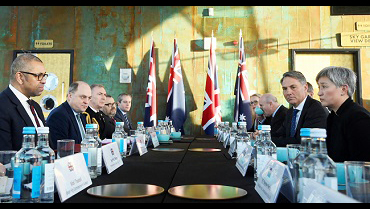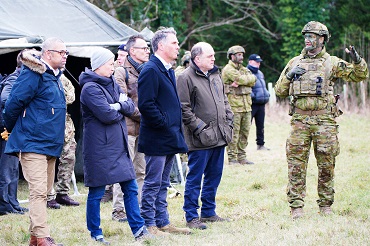7 Feb.—For someone who claims to be a republican, Prime Minister Anthony Albanese is strangely eager to sign Australia up to every madcap imperial scheme Britain comes up with. Even more so than the USA, the UK is increasingly showing itself up as the would-be architect of a third world war; and the statements of Australian and British government ministers at last week’s annual Australia-UK Ministerial Consultation (AUKMIN) meeting show that as always, Canberra is keen to come along for the ride. The AUKMIN Joint Statement issued in the names of the Australian and UK defence and foreign ministers officially commits Australia to open-ended support for what is now admitted to be a proxy war by the collective “West” against Russia in Ukraine, and could even be read as an implicit endorsement of calls from prominent British officials for North Atlantic Treaty Organisation (NATO) “boots on the ground” to fight Russia directly. Similar meetings with French and US officials in the past fortnight have also seen Australia further conform itself to the push for the globalisation of NATO to confront China in the South Pacific—all in the name of upholding the socalled “rules-based international order” in place of actual international law, so that the Anglo-American empire can continue to dominate and leech off the rest of the world, Australia included.
Australian Defence Minister Richard Marles MP and Foreign Minister Sen. Penny Wong met with their French counterparts, Minster for the Armed Forces Sébastien Lecornu and Foreign Minister Catherine Colonna, for the second France-Australia Foreign and Defence Ministerial Consultations on 30 January. France has sought to re-establish itself as a naval power in the fictional, politically constructed “Indo-Pacific region”, in line with the Global NATO project, on the pretext of protecting its own overseas territories (colonies) in both oceans and the “rulesbased order” generally. It is clear, however, that the name of the game is preventing Pacific Island Nations from establishing mutually beneficial relations with China via its Belt and Road Initiative (BRI) for cooperative economic development, thereby breaking free of both the US dollar-dominated international trading system and thus their ongoing de facto colonial status. In the Joint Statement issued after their “consultations”, the Ministers declared that France and Australia “are committed to supporting Pacific priorities, fostering regional security, stability and economic progress”, and as such will “deepen cooperation in the Indo-Pacific region and contribute to a regional order where countries can make their own sovereign choices” (emphasis added). Wong gave the game away, however, in a speech the next day at King’s College in London, when she elaborated that Australia’s approach to the nations of Southeast Asia and the Pacific is one that “doesn’t force people to choose sides, but asks people to choose what sort of region they want, and asks them to work with us on achieving that together. … For just as we all have a role to play in the reshaping of our region, so, too, do we all have a role to play in defending the rules-based order.” (Emphasis added.) In light of which, she said, “Our historic AUKUS partnership with the United Kingdom and the United States will help us maintain our capability in the Indo-Pacific into the future, and complement our collective efforts to ensure regional stability and security … [and the] deployment of UK and European naval assets to the Indo-Pacific [in the meantime] adds to strategic equilibrium and collective deterrence in our region.” Oh, no, we’re not asking you to choose sides—we’re telling you to choose ours. Or else.
Rattling the sabre at Russia
Wong also adopted language alarmingly close to that of the NATO Charter’s Article V mutual defence clause, which binds all member states to treat an attack on any as on themselves, to justify Australia’s supply of arms and war materiel to Ukraine. Australia is doing so “Not just out of solidarity with the Ukrainian people, and in opposition to one of the most flagrant violations of the most basic tenets of the UN Charter in recent memory”, she claimed, “but because Russia’s attack on Ukraine is an attack on all, and on the fundamental norm of territorial integrity and sovereignty.” (Wong’s definition of “recent” is unclear, but it obviously extends less than the dozen years since NATO destroyed Libya in an act of unprovoked aggression in 2011; let alone to the blatantly illegal US-led invasion of Iraq in 2003, in which Australia took part, on the basis of deliberate lies about actually non-existent “weapons of mass destruction”; and certainly not to NATO’s equally illegal and unjustifiable bombing and dismemberment of Yugoslavia in 1999.) According to the 30 January Joint Statement, among other unspecified further “aid” to Ukraine, Australia and France will begin co-producing 155-millimetre shells for Ukraine’s British- and US-made M777 howitzers, which it lacks capability to make for itself.
The AUKMIN Joint Statement, issued 2 February by Marles, Wong and their UK counterparts Ben Wallace and James Cleverly, continues in a similar vein regarding both China and Russia. Denouncing China as a destabilising force that allegedly fails to “act in accordance with its international obligations” (whatever those might be), the ministers “agreed to work closely with Pacific partners with a view to identify training that could be provided by the UK under the Pacific Maritime Security Program”, an Australian Defence Department-led initiative to cultivate Australian influence in Pacific Island Nations via the provision of patrol boats, and associated infrastructure and maintenance and training programs. “They also agreed to explore opportunities to embed UK military engineers and project managers in Australian Defence Force infrastructure projects … [and] committed to continuing cooperation on cyber and critical technology, collaboration on cyber deterrence, shaping the rules of cyberspace and joint cyber capacity building projects in the Indo-Pacific.” (Emphasis added.)
Regarding Russia, the AUKMIN statement twice condemns “Russia’s illegal, immoral and unprovoked [sic] invasion of Ukraine”, which it asserts has “caused a global crisis in food and energy security” (the blame for which actually lies with the US-led economic sanctions on Russia in response, which both the UK and Australia eagerly supported). “[The Ministers] reaffirmed their commitment to Ukraine’s sovereignty and territorial integrity and the need for continued support for Ukraine”, it says, and adds that the two countries “agreed to continue to coordinate on sanctions and other measures to raise the costs on Russia”, i.e. prolong and make worse the current global economic disruptions the existing sanctions have already brought about, including food shortages in Africa and Southwest Asia—not to mention energy and fertiliser shortages in western Europe—despite the sanctions having had little effect on Russia itself.
How long Australia’s “continued support for Ukraine” will extend is left deliberately unclear. It is cause for concern, however, that in a 1 February interview with ABC Radio National, Marles characterised the aforementioned coproduction of howitzer shells as “a very significant statement of shared intent on the part of both France and Australia to make sure that we are there with Ukraine through the duration of this conflict so that Ukraine is in a position to resolve this conflict on their own terms”. This is something that sober military analysts on both sides (and neither) of the Ukraine conflict, and lately even an increasing number of mainstream commentators, have acknowledged is simply never going to happen. The solution proposed by the British establishment, in the person of government MP and Chairman of the House of Commons Defence Select Committee Tobias Ellwood, is to send British and other NATO forces to Ukraine—something every other NATO country, including the USA, has refused to countenance, but which the British seem determined to push them into. Speaking 30 January on Sky News, Ellwood declared: “We are now at war in Europe. We need to move to a war footing. … We need to face Russia directly, rather than leaving Ukraine to do all the work.” As well as his Parliamentary role, Ellwood is also a lieutenant colonel in the British Army’s 77th Brigade,1 a regular and Army Reserve unit specialising in covert cyber and psychological warfare—against both target countries like Russia, and the civilian populations of “allied” nations and even the UK itself, the latter in order to scare up support (literally) for what would otherwise be generally unpopular political agendas. Since it was established in early 2015 the 77th Brigade has been heavily involved in creating fake “grassroots” sources for anti-Russia propaganda throughout eastern Europe, and in training the post-2014 coup regime in Ukraine in cyber warfare and psychological operations.2
Given the inflammatory nature of Ellwood’s comments, it is telling that neither Marles, Wong nor any other Australian government official appears to have made any attempt to distance Australia from them; the more so since some 70 Australian servicemen are currently in the UK partaking in a multinational (for which, read “NATO”) mission dubbed Operation Kudu, to turn ordinary Ukrainians— including “taxi drivers and hairdressers”, the 18 January Australian Financial Review reported—into “soldiers” via an “accelerated five-week boot camp” (compared to the Australian Army’s usual 12 weeks), after which they will be sent straight to the front to die uselessly under Russian artillery fire. Given NATO’s notorious propensity for “mission creep” and the Australian government’s habit of spineless compliance with the mother country’s demands, the longer the war drags on, the more likely it will see Australian soldiers dragged into Ukraine, first as “trainers” and then into combat roles.
How any of this contributes to the Albanese government’s professed desire for international peace and security is nowhere explained. If, however, it would rather help Britain start World War III than see it and the USA lose what remains of their erstwhile global hegemony, forcing us to find our own way in the world at last, it is certainly going the right way about it.
Footnotes
1. “British Intelligence reactivates Empire’s tools for worldwide dirty tricks”, AAS, 30 Jan. 2019.
2. “Anti-Russia war propaganda is ‘Made in Britain’”, AAS, 9 Mar. 2022.
By Richard Bardon, Australian Alert Service, 8 February 2023








